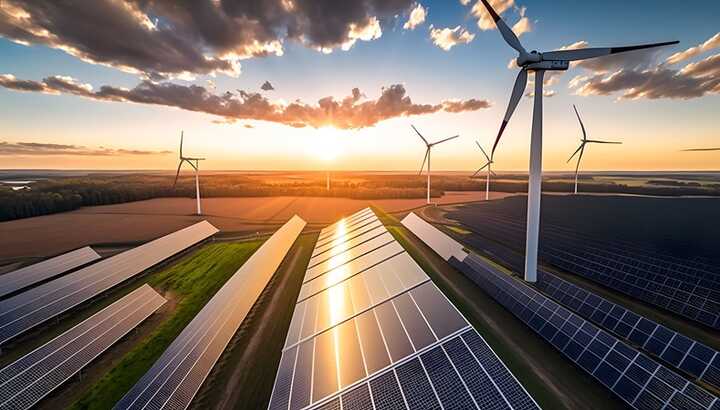
Hitting target for zero-carbon electricity system will require ‘step change’, says analyst Cornwall Insight
Solar and wind power generation will fall well below the target needed to decarbonise Great Britain’s electricity grid by 2030 without an injection of £48bn, according to a forecast from one of the UK’s leading energy analysis companies.
The government has promised to deliver a zero-carbon electricity system by 2030, requiring the doubling of onshore wind, tripling of solar power and quadrupling of offshore wind capacity.
Cornwall Insight, which has emerged as one of the leading energy forecasters in recent years, warned that hitting that target would require a “step change” to close the renewable investment gap.
Under current projections, solar and wind are on course to account for just 44% of Great Britain’s electricity by 2030, the analyst said, well below the 67% that would be required to remove fossil fuels from the power generation system.
Under its projections gas would still account for 19% of electricity generation by 2030, more than either solar, onshore wind or offshore wind.
Cornwall said an additional £48bn would be needed, on top of £18bn that scheduled energy infrastructure projects are expected to cost, to meet the government’s goal for renewables.
However, it warned that achieving such a transformation would be a “substantial challenge” because of a combination of funding constraints, supply chain problems, limited port capacity and the need to build many more links into the National Grid.
“Attracting that investment is going to be critical to delivery,” Cornwall said, adding that schemes such as “contracts for difference”, which lock in returns for investors by setting a fixed price for electricity, might be needed.
The Cornwall principal modeller, Tom Edwards, said: “International competition for project development coupled with material shortages are challenging issues that often lie beyond a government’s control.
“Additionally, updates to grid connections, increased storage and a whole plethora of other policy changes will be needed to make a 2030 zero-carbon power system a realistic target.
“The swift actions of the new government, such as lifting the de facto ban on onshore wind, are encouraging. However, much more needs to be done to turn decarbonisation promises into a reality.”
A government spokesperson said: “We are taking immediate action implementing our long-term plan to make Britain a clean energy superpower.
“In just one week, we have swept away barriers to onshore windfarms, consented more solar power than has been installed in the past year and set out plans for a solar rooftop revolution.
“Investing in clean power is the only way to guarantee our energy security and protect bbill payers permanently, which is why we will double onshore wind, treble solar and quadruple offshore wind by 2030.”
Labour’s main policy on renewable power is the creation of the state-owned company GB Energy to invest in wind, solar and other projects. The government has also announced plans to speed up the planning process, to get new power projects off the ground sooner.
Last week the government’s climate watchdog, the Climate Change Committee, warned that policies put in place by Rishi Sunak’s government had left the UK on course to meet only about a third of the emissions cuts necessary to reach the UK’s Paris agreement target of cutting carbon by 68% by 2030.
Read more similar news:
Comments:
comments powered by Disqus

































